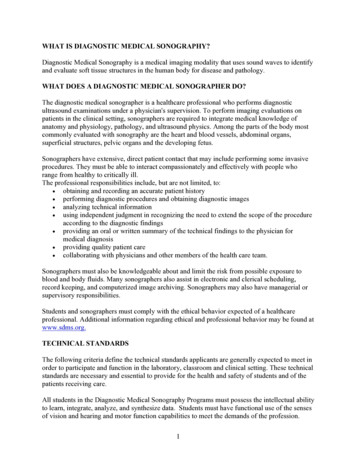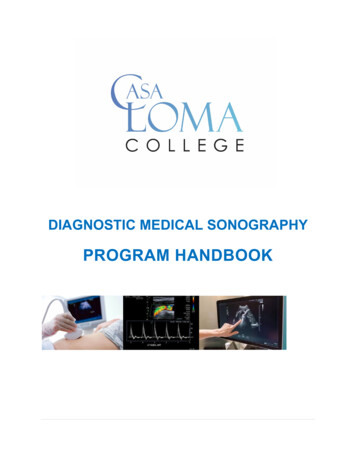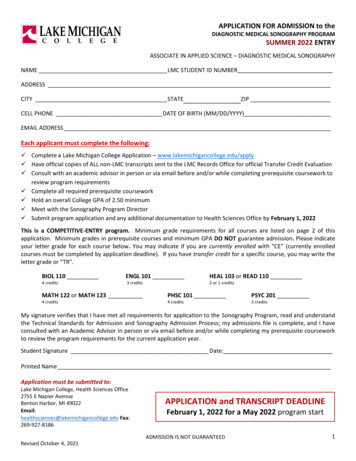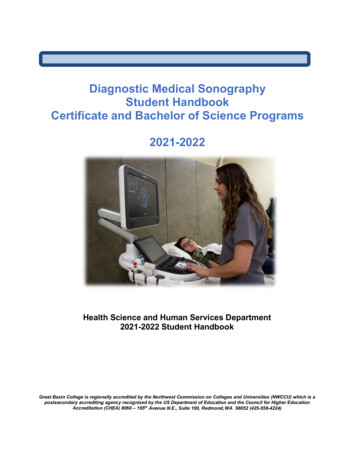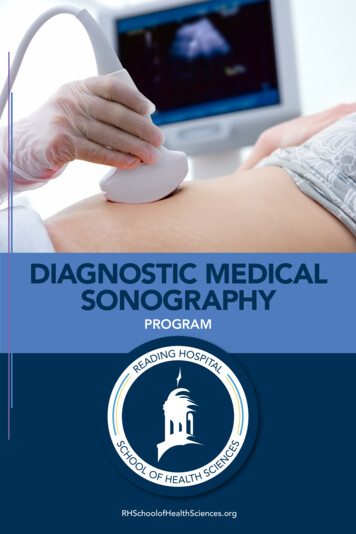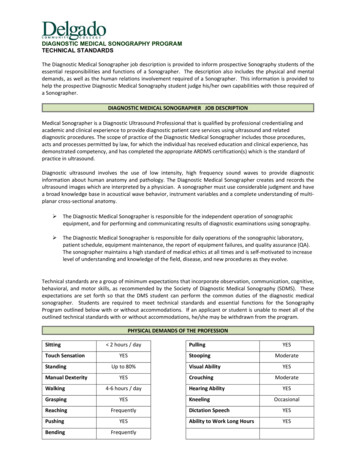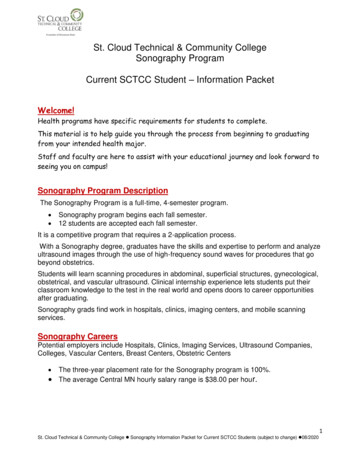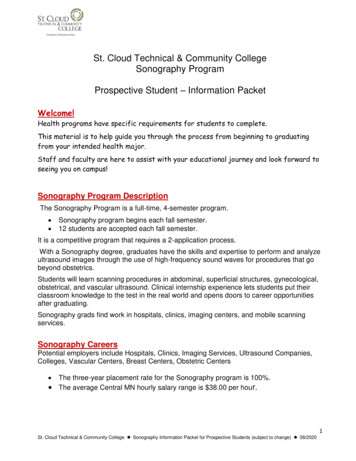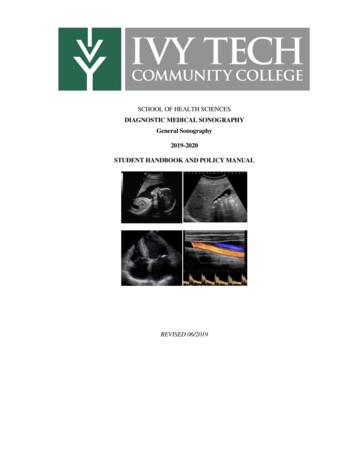
Transcription
SCHOOL OF HEALTH SCIENCESDIAGNOSTIC MEDICAL SONOGRAPHYGeneral Sonography2019-2020STUDENT HANDBOOK AND POLICY MANUALREVISED 06/2019
TABLE OF CONTENTS1-3SECTION I – COLLEGE AND PROGRAM GENERAL INFORMATIONCertification DisclaimerHandbook DisclaimerIntroductionAccreditation StatusDiagnostic Medical Sonography Mission StatementProgram GoalsProgram OutcomesProgram EffectivenessCollege Mission, Vision and GoalsSchool AccreditationInstruction and Administrative PersonnelCode of Ethics for the ProfessionConflicts of InterestSonography Student’s RightsProfessional BehaviorsNon-Discrimination StatementAmerican Disabilities Act StatementFelony and Other ConvictionsRecruitmentAdmissionsProgram Selection ProcessTransfer StudentsRefunds & Drop DatesStudent ServicesNon-traditional Program CompletionWithdrawalReadmissionProgram ProgressionGraduation RequirementsStudent RepresentationProfessional OrganizationsTuitionAdditional FeesWeather ClosingsName, Address, and Phone Number ChangeRemediationChildcareSexual HarassmentTitle IX StatementProhibition against Alcohol and Drug 51515161616161717171717181818SECTION II – CLINICAL AND DIDACTIC EDUCATIONClinical EducationProfessional ConductPhysical Requirements for ClinicalEssential Functions and Specific Physical Examination Essential FunctionsClinical AffiliatesClinical TravelClinical Hours120202021-24252526Diagnostic Medical Sonography Handbook and Policy Manual- Revised June 2019
Clinical Hours and Sonography Clinical HoursAltering Clinical RecordsClinical Attendance PolicyClinical Site Leave of Absence PolicyClinical PunctualityTelephone PolicySonography Student Working as StaffOutside JobsLiability InsuranceCPRDress Code and HygieneBackground Check & Drug TestingDrug & Alcohol ConsumptionRandom Drug TestingClinical PropertyPortable ExaminationsDirect SupervisionIndirect SupervisionSupervision for Repeated ExamsSocial MediaSpecial Rotations for Evening and Weekend Clinical AssignmentsOperating Room Clinical Education ObjectivesProficiency/Competency EvaluationsProficiency and Competency Categories of EvaluationAffective Domain Areas of EvaluationClinical and Didactic Grading PolicyDidactic and Lab Attendance and Instruction PolicyProfessional DevelopmentRequired Courses for GraduationTextbooksAcademic AdvisementPlagiarismAcademic HonestyAcademic Probation and SuspensionAcademic CalendarProgrammatic Academic DismissalGrounds for DismissalPeer-Volunteer ScanningSonography LabElectrical Safety RulesProgram and Clinical 8SECTION III – RIGHTS AND RESPONSIBILITIESStudent Right to Know – ProgramStudent RightsStudent ResponsibilitiesStudent Disciplinary ProceduresStudent Grievance Process – CollegeInformal Grievance ProcedureFormal Grievance ProcedureDisciplinary ActionsProblems404040404040-4141-4243432Diagnostic Medical Sonography Handbook and Policy Manual- Revised June 2019
SECTION IV – HEALTH AND SAFTEY PRACTICESCommunicable DiseasesInfectious DiseasesInfection ControlStudent Verification of Training in Standard PrecautionsWorkplace HazardsEmergency ResponsePregnancy Policy and Example FormHealth Insurance45454545454646-4747SECTION V – FORMSGrounds for DismissalSonography Lab RulesLatex AllergyAgreement to Pregnancy PolicyAcademic Grading Policy RequirementsPortable ExaminationsDirect and Indirect SupervisionClinical Hours Agreement Clinical Participation ContractClinical Attendance PolicyCriminal Background Check & Drug TestingEthics EligibilityRandom Drug TestingConfidentiality StatementHandbook tic Medical Sonography Handbook and Policy Manual- Revised June 2019
SECTION ICOLLEGE AND PROGRAM GENERAL INFORMATION4Diagnostic Medical Sonography Handbook and Policy Manual- Revised June 2019
CERTIFICATION/LICENSURE TRAINING DISCLAIMER:Ivy Tech Community College (Terre Haute) cannot guarantee that any student will pass acertification or licensing exam. Your success will be determined by several factors beyondthe instruction you are given in the classroom including your test-taking skills, yourwillingness to study outside of class, and your satisfactory completion of appropriatepractice exams. Certification and licensure exam questions are drawn from databases ofhundreds of possible questions; therefore, a thorough understanding of the subject matter isrequired. The goal of Ivy Tech in providing a certification exam studies class is to assistyou in understanding the material sufficiently to provide a firm foundation for your studiesas you prepare for the exam.HANDBOOK DISCLAIMERThis handbook is intended to supply accurate information to the reader. From time to time,certain information may be changed. The College may revise any matter described in thishandbook at any time without publishing a revised version of the handbook. Every effortwill be made to keep students informed of all changes in the program. Courses, programs,curricula, and/or program requirements may be changed or discontinued at any time. TheOffice of Student Affairs should verify information, which appears to apply to a particularstudent. This publication and its provisions are not in any way a contract between thestudent and Ivy Tech Community College.5Diagnostic Medical Sonography Handbook and Policy Manual- Revised June 2019
INTRODUCTIONWelcome to the Ivy Tech Community College, Terre Haute Diagnostic Medical Sonography Program. This handbook isto inform and guide you through the requirements and policies to which you must adhere as you progress through theprogram. This program is designed to provide you with the knowledge and experience necessary to pursue a career inDiagnostic Medical Sonography. Ivy Tech Community College graduates of this program also receive an Associate ofApplied Science (AAS) degree.The primary objective of this student handbook is to provide sonography students with a manual for the DMSI Program.All students at Ivy Tech Community College are subject to the rules and regulations in the current college catalog, theStudent Code of Conduct, and the College Policy and Procedure Manual. In addition to these rules and regulations, thereare policies, procedures, and guidelines that are specific to DMSI students.This handbook deals specifically with the policies and procedures for the Diagnostic Medical Sonography Program andserves to assist sonography students toward successful completion of their course of study. Each student has theresponsibility to read thoroughly and review this handbook regularly and to be knowledgeable of its contents.ACCREDITATION STATUSThe Diagnostic Medical Sonography program at Ivy Tech Community College, Terre Haute, is accredited by theCommission on Accreditation of Allied Health Education Programs (CAAHEP) on recommendation by the Joint ReviewCommittee on Education in Diagnostic Medical Sonography (JRC-DMS) in general, vascular and cardiac concentrations.DIAGNOSTIC MEDICAL SONOGRAPHY MISSION STATEMENTThe mission of the Diagnostic Medical Sonography Concentration at Ivy Tech Community College, Terre HauteRegion is to provide a competency based educational experience that reflects the accepted standards of the professionand provides students with the knowledge, skills, and attitudes necessary to succeed as sonographers.PROGRAM GOALSWith faith in the faculty, clinical instructors and the Advisory Committee, we set forth the following goals for theProgram: "To prepare competent entry-level general sonographers in the cognitive (knowledge), psychomotor (skills),and affective (behavior) learning domains" and/or"To prepare competent entry-level adult cardiac sonographers in the cognitive (knowledge), psychomotor(skills), and affective (behavior) learning domains" and/or“To prepare competent entry-level vascular technologists in the cognitive (knowledge), psychomotor (skills),and affective (behavior) learning domains.”To provide graduates who possess a lifelong desire of education that can fulfill the needs of the carecommunity in an ethical manner.Provide an educational program which accepts students using procedures and practices that provide equaladmission and educational opportunities without regard to race, ethnic background, creed, sex, sexualorientation, age, disabling conditions, or natural origin and represent non-discriminatory practices in allactions.Provide students with curriculum, including contemporary educational methodology and technology thatprepares them for entry-level employment as diagnostic medical sonographers.To help students communicate effectively by developing both expressive and receptive language skills to anappropriate level of competency for the profession.Prepare the student with the education needed to pass certification examinations.6Diagnostic Medical Sonography Handbook and Policy Manual- Revised June 2019
PROGRAM OUTCOMES1. Students are able to competently perform routine procedures.2. Students demonstrate knowledge and skills of patient care.3. Students demonstrate diagnostic sonography safety to self, patients and others.4. Graduates indicate an overall satisfaction with the program.5. Graduates will have the knowledge needed to pass certification examinations.6. Graduates obtain employment within 6 months.7. Students apply knowledge of anatomy, physiology, positioning, to acutely identify structures on ultrasound imagesand other imaging modalities.8. The students will demonstrate how to perform non-routine to accommodate the patient condition and other variables.9. Students will demonstrate critical thinking skills in critical situations and surgery.10. Students will demonstrate effective written communication skills.11. Student will demonstrate effective verbal and nonverbal communication skills with all patients.PROGRAM EFFECTIVENESSGraduating Class2014- GeneralAttrition0%Job Placement100%SPI80%2015- Vascular2016- General7%15%79%91%100%91%2016- AdultEchocardiography2017- Vascular7%85%100% 10/1023%100%100% 6/62018- General13%92%100% 12/12Credentials Earned7/8 Abdominal – 88%8/8 OB/GYN- 100%RVT or RVS - 86%7/7 Abdominal – 100%10/10 OB/GYN – 100%12/12 RDCS or RCS –100%7/7 SPI & RVT or RVS10/10 Abdominal6/6 OB/GYNCOLLEGE MISSION, VISION AND GOALSMission StatementIvy Tech Community College prepares Indiana residents to learn, live, and work in a diverse and globally competitiveenvironment by delivering professional, technical, transfer and lifelong education. Through its affordable, open-accesseducation and training programs, the College enhances the development of Indiana's citizens and communities andstrengthens its economy.Vision StatementChanging LivesMaking Indiana GreatOur Core ValuesWe value, respect and promote:Student-centered: Our students' right to reach their potential Our students' capability to achieve their educational/personal goals The diverse life experiences of each student Behavior that will enhance the dignity and worth of all students Student need for lifelong learning skills Student contributions to the learning community Students as individualsFaculty and staff-focused: The individual and collective contributions of all faculty and staff The diverse life experiences of each employee7Diagnostic Medical Sonography Handbook and Policy Manual- Revised June 2019
The importance of investing in personal and professional development of all employeesOpenness, honesty and integrity in all employee interactionsA culture of leadership developmentEmployees as our greatest assetDiversity: Diversity of thought and opinion The uniqueness of all of our students and employees Cultural experiences of all students and employees An inclusive climate that recognizes and supports a diverse learning and work environment Curricular and co-curricular experiences that enrich student learning Equal rights and opportunities for allIntegrity: Honest and forthright communications with all constituencies Ethical conduct Full and direct disclosure in all print and electronic materials Ethical business practices with all partners Accountable and responsible stewardship of all College resources Confidentiality as required by law and professional standards Fair and consistent treatment of all students and employeesCommunity Engagement: Being a responsible corporate citizen A strong spirit of volunteerism among students and employees Collaborative partnerships Campuses that are catalysts for service to the community Active engagement and leadership in the communityInnovation: The creation and application of knowledge Keeping an open mind to new ideas A spirit of entrepreneurialism Responsible risk-taking The recognition and celebration of innovative initiatives Continuous improvement A climate conducive to sharing successes and failuresExcellence: High academic expectations A teaching and learning environment that allows students and faculty to achieve their full potential Development of our students as confident, capable people contributing to family, workplace and society High-quality programs and services Holding ourselves and each other accountable for fulfilling our mission and achieving our visionSCHOOL ACCREDITATIONIvy Tech Community College of Indiana is accredited by the Higher Learning Commission of the North CentralAssociation of Colleges and Schools (312)-263-0456). The college has also earned other regional accreditations.8Diagnostic Medical Sonography Handbook and Policy Manual- Revised June 2019
INSTRUCTION AND ADMINISTRATIVE PERSONNELIvy Tech Community College812-299-1121800-377-4882School of Health Sciences Office812-298-2239School of Health Sciences FAX812-298-2392NamePositionLea Anne Crookslcrooks@ivytech.eduChancellor812-298-2367Dr. Deanna Kingdking@ivytech.eduVice Chancellor of Academic Affairs812-298-2205Leah Allmanlallman@ivytech.eduVice Chancellor of Student Affairs812-298-2289Julie Will, RN, MSNjwill@ivytech.eduDean of School of Health Sciences812-298-2244Jennafer Grasfeder, MLD, RDMS, RVT, RDCS, RT(R)jgrasfeder@ivytech.eduProgram Director/Program Chair812-298-2237Kaye Amend, BA, RVT, RDCSKamend1@ivytech.eduClinical Coordinator812-298-2311Tony Nasser, MDThomas Yeagley, MDBrian Holland, MDMedical Advisor (Cardiac & Vascular)Medical Advisor (General)Medical Advisor (Cardiac- Sellersburg)Lurissa Eversonleverson@ivytech.eduHealth Sciences Administrative Assistant812-298-22399Diagnostic Medical Sonography Handbook and Policy Manual- Revised June 2019
Code of Ethics for the Profession of Diagnostic Medical SonographyApproved by SDMS Board of Directors, February 8, 2017PREAMBLEThe goal of this code of ethics is to promote excellence in patient care by fostering responsibility and accountability amongdiagnostic medical sonographers. In so doing, the integrity of the profession of diagnostic medical sonography will bemaintained.OBJECTIVES1. To create and encourage an environment where professional and ethical issues are discussed and addressed.2. To help the individual diagnostic medical sonographer identify ethical issues.3. To provide guidelines for individual diagnostic medical sonographers regarding ethical behavior.PRINCIPLESPrinciple I: In order to promote patient well-being, the diagnostic medical sonographer shall:A. Provide information to the patient about the purpose of the sonography procedure and respond to the patient's questions andconcerns.B. Respect the patient's autonomy and the right to refuse the procedure.C. Recognize the patient's individuality and provide care in a non-judgmental and non-discriminatory manner.D. Promote the privacy, dignity and comfort of the patient by thoroughly explaining the examination, patient positioning andimplementing proper draping techniques.E. Maintain confidentiality of acquired patient information, and follow national patient privacy regulations as required by the"Health Insurance Portability and Accountability Act of 1996 (HIPAA)."F. Promote patient safety during the provision of sonography procedures and while the patient is in the care of the diagnosticmedical sonographer.Principle II: To promote the highest level of competent practice, diagnostic medical sonographers shall:A. Obtain appropriate diagnostic medical sonography education and clinical skills to ensure competence.B. Achieve and maintain specialty specific sonography credentials. Sonography credentials must be awarded by a nationalsonography credentialing body that is accredited by a national organization which accredits credentialing bodies, i.e.,the National Commission for Certifying Agencies (NCCA) or the International Organization for Standardization (ISO).C. Uphold professional standards by adhering to defined technical protocols and diagnostic criteria established by peer review.D. Acknowledge personal and legal limits, practice within the defined scope of practice, and assume responsibility for his/heractions.E. Maintain continued competence through lifelong learning, which includes continuing education, acquisition of specialtyspecific credentials and recredentialing.F. Perform medically indicated ultrasound studies, ordered by a licensed physician or their designated health care provider.G. Protect patients and/or study subjects by adhering to oversight and approval of investigational procedures, includingdocumented informed consent.H. Refrain from the use of any substances that may alter judgment or skill and thereby compromise patient care.I. Be accountable and participate in regular assessment and review of equipment, procedures, protocols, and results. This can beaccomplished through facility accreditation.Principle III: To promote professional integrity and public trust, the diagnostic medical sonographer shall:A. Be truthful and promote appropriate communications with patients and colleagues.B. Respect the rights of patients, colleagues and yourself.C. Avoid conflicts of interest and situations that exploit others or misrepresent information.D. Accurately represent his/her experience, education and credentialing.E. Promote equitable access to care.F. Collaborate with professional colleagues to create an environment that promotes communication and respect.G. Communicate and collaborate with others to promote ethical practice.H. Engage in ethical billing practices.I. Engage only in legal arrangements in the medical industry.J. Report deviations from the Code of Ethics to institutional leadership for internal sanctions, local intervention and/or criminalprosecution. The Code of Ethics can serve as a valuable tool to develop local policies and procedures.10Diagnostic Medical Sonography Handbook and Policy Manual- Revised June 2019
CONFLICTS OF INTERESTWe realize that at Ivy Tech Community College our student are all adults. We will treat you as such and in return, weexpect you to behave as such. In addition, we expect you to exhibit professional attitudes that avoid conflicts of interest.However, the students’ performance must be accurately evaluated in an unbiased manner.Any student who in the opinion of program officials, establishes a conspicuous relationship with any technologist or anyother medical professional at a clinical site that could possibly have an effect on their achievement of competency whenperforming examinations as a student technologist, will be removed from that clinical site and placed in another clinicalsite. The student’s clinical abilities and clinical competencies must be fairly and accurately evaluated. This may be doneat the discretion of program officials.DIAGNOSTIC MEDICAL SONOGRAPHY STUDENTS RIGHTSDuring your attendance in the Diagnostic Medical Sonography Program you have the following rights:1. Ask for help or time of faculty and program officials.2. Make requests that are sanctioned by the rules outlined in this handbook.3. Ask questions at any time.4. Refuse requests for personal information.5. Submit your feedback on issues including disappointments, frustrations, etc.6. Ask for fair evaluations.7. Be treated with respect.8. Negotiate differences and conflicts.9. Make mistakes and take responsibility for them.For complete and detailed information regarding student rights, expectations, College policy, and the judicial process, acopy of the Code of Student Rights and Responsibilities may be obtained from the College’s website (www.ivytech.edu);via the College’s student portal, on My Ivy or from the Office of the Vice Chancellor of Student Affairs.PROFESSIONAL BEHAVIORSBelow are behaviors that are expected of students at Ivy Tech Community College:1. Be prepared; read assignments ahead of time.2. Ask questions when unsure; participate in class & clinical discussions.3. Show initiative; seek independence when appropriate.4. Dress according to the dress code. Wear professional attire when guests are present, when on a field trip, orwhen giving class presentations.5. Use reference materials to enhance learning. Take advantage of learning opportunities and activities.6. Handle personal & professional frustrations appropriately. Seek assistance when needed.7. Maintain confidentiality of others at all times.8. Use active listening with others while responding to the needs of patients, peers, and faculty.9. Use time wisely and effectively.10. Demonstrate self-confidence.11. Be tactful and constructive when giving or receiving criticism.12. Be flexible; effectively adjust to change; adjust priorities.13. Be dependable, others will be counting on you.14. Have a sense of humor. Laughing is good medicine!11Diagnostic Medical Sonography Handbook and Policy Manual- Revised June 2019
NON-DISCRIMINATION AND EQUAL OPPORTUNITY POLICYIvy Tech Community College of Indiana provides open admission, degree credit programs, coursesand community service offerings, and student support services for all persons regardless of race,color, creed, national origin, religion, gender, sexual orientation, physical or mental disability, age,or veteran status. The College also provides opportunities to students on the same nondiscriminatory basis. Persons who believe they may have been discriminated against shouldcontact the campus affirmative action officer, Human Resources Administrator, or the ViceChancellor of Student Affairs. Ivy Tech Community College of Indiana is an accredited, equalopportunity/affirmative action institution.AMERICAN DISABILITIES ACT STATEMENTIvy Tech Community College seeks to provide effective services and accommodations for qualified individuals withdocumented disabilities. If you need an accommodation because of a documented disability, you are required to registerwith Disability Support Services at the beginning of the semester. If you will require assistance during an emergencyevacuation, notify your instructor immediately. Look for evacuation procedures posted in your classrooms.FELONY OR OTHER CONVICTIONSStudents accepted to this program must have a criminal background check completed before starting clinical rotations.See policy for specific information. Credentialing bodies will not allow individuals with certain misdemeanors orfelonies to take the registry examinations. Some exceptions are made, depending on the nature of themisdemeanor/felony. A review of eligibility can be completed in advance to determine if an individual will be eligibleto sit for examinations by the credentialing body. Individuals who have been convicted should contact the credentialingagency to determine if he/she is eligible.Completion of a criminal background check and drug screening for a Health Sciences program does not ensureeligibility for licensure, credentialing, or future employment. Clearance by the credentialing body for board eligibilitydoes not guarantee the clearance by the clinical site to participate in the clinical setting.If there is a positive finding on either the background or drug screen, the clinical sites will have the determination ofclinical participation. The degree cannot be awarded without clinical assignment completion regardless of thecredentialing body decision.*Throughout your time in the program it is also your responsibility to self-report any occurrences orinfractions that may appear on your record after the initial background check. You will not be allowed toreturn to clinicals until the matter has been cleared by the clinical site.*If you should have a criminal matter in your past after you have reached age 18, whether it is recent or not, you mustcontact the following credentialing body for eligibility that pertains to you:American Registry of Radiologic Technologists at 651-687-0048American Registry of Diagnostic Medical Sonographers at 800-541-9754Cardiovascular Credentialing International at 800-326-026812Diagnostic Medical Sonography Handbook and Policy Manual- Revised June 2019
RECRUITMENTThe program’s course offerings are published in the Ivy Tech Community College Course Catalog, the Internet website, Program sheets, and the Application and Information packets. Packets are available on line ISSIONSCOLLEGE:For complete information on how to enroll in an Ivy Tech Community College at a campus near you, go toivytech.edu/apply-now/. After you've submitted a complete application, you will receive information in the mail within7-10 business days. Upon receiving your acceptance letter, please begin working on your next steps. You will beencouraged to meet with an Academic Advisor, attend a new student orientation, and complete financial aid forms.SONOGRAPHY PROGRAM1. Send the “Application for the Diagnostic Medical Sonography Program to the Program Office (Terre Haute campus)by the deadline date stated in the application packet.2. Submit an Ivy Tech Community College transcript and any other transcripts to the Diagnostic Medical SonographyProgram at the Terre Haute campus with the application.3. If you have previous college courses from other colleges/universities make sure they have been officially approvedas transfers by the registrar’s office at Ivy Tech Community College. You can view accepted transfers from otherIndiana colleges and universities at www.transferin.net.4. Successfully complete the following four (4) prerequisite courses by the end of the fall semester. These are thecourses that will be awarded points for grades. APHY 101 – Anatomy and Physiology I ENGL 111 – English Composition HLHS 101 – Medical Terminology MATH 136 – College AlgebraIf course has been repeated, we will take the highest score of the first two attempts. The policy states “When the studenthas taken a prerequisite course more than once, points will be determined using the highest grade for the initial (first)two course attempts appearing on both Ivy Tech and other college transcripts. Grades for courses over 3 years old maybe excluded from consideration with the applicant’s written request included in the application packet. Excluding thosegrades from the admission point system does not affect calculation of the student’s grade point average (GPA).”5. Successfully complete all of the other prerequisites by June 1st of the following spring semester. The grades forthese courses are not used in calculations for student selection but must be completed before the beginning of theprogram. These courses are the following: IVYT 112– First Year Seminar PSYC 101 or SOCI 111 – Either Psychology or Sociology COMM 101 or COMM 102 – Either Speech or Interpersonal Communication APHY 102 – Anatomy and Physiology II RADT 117 – Radiation Physics and Equipment OperationFailure to complete the prerequisites would mean that the student would forfeit his or her spot and the next studentwith the highest points will be offered admittance into the program.6. Take the USA, Ultrasound Student Assessment test, and submit results by the application date.The USA exam can be taken at the Terre Haute and Sellersburg Ivy Tech Community College’s campuses’ Assessmentcenters. The testing centers will have scheduled times for the test This is an examination of inherent skills that are essential for the sonography profession. There is no studying13Diagnostic Medical Sonography Handbook and Policy Manual- Revised June 2019
required.The test will evaluate hand-eye coordination, logic, reasoning, persistence, visual and spatial resolution,judgement, and graph interpretation.This is a one-time per application cycle examination.The student must pay the approved testing fee each time.The “Combined Score” will be used to calculate points for the application using the conversion chart at theend of this application packet. You will need to contact Jennafer Grasfeder or Kaye Amend for a copy of yourscores. These are required as part of your application.SELECTION PROCESSSelection is based on points. To see how points are awarded, we have provided an example of the Evaluation Grid atthe end of this packet. Points are given for Anatomy and Physiology (APHY 101), the math course (MATH 136),English Composition (ENGL 111), and Medical Terminology (HLHS 101). The maximum points for this section are21. The USA test is given points correlated to the combined score. The maximum points for the USA exam are 10.Once admitted into the program, you will be notified by mail. New DMSI students will be required to do the following: DMSI students will be required to attend an orientation meeting, usually held in June. DMSI students will be required to have a Criminal Background Check and Drug Test throughCertified Background. Detailed information will be sent to the students that have been selected intothe program. Students will also be required to have a proof of inoculations, including a recent TB test, and physicalfrom their physician. New students will be required to be CPR (Healthcare Provider) certified before the Program begins. New students begin each fall semester and c
6 Diagnostic Medical Sonography Handbook and Policy Manual- Revised June 2019 INTRODUCTION Welcome to the Ivy Tech Community College, Terre Haute Diagnostic Medical Sonography Program. This handbook is to inform and guide you through the requirements and policies to which you must adhere as you progress through the program.
